Notion AI Tool Review: Features, Use Cases & Productivity Tips
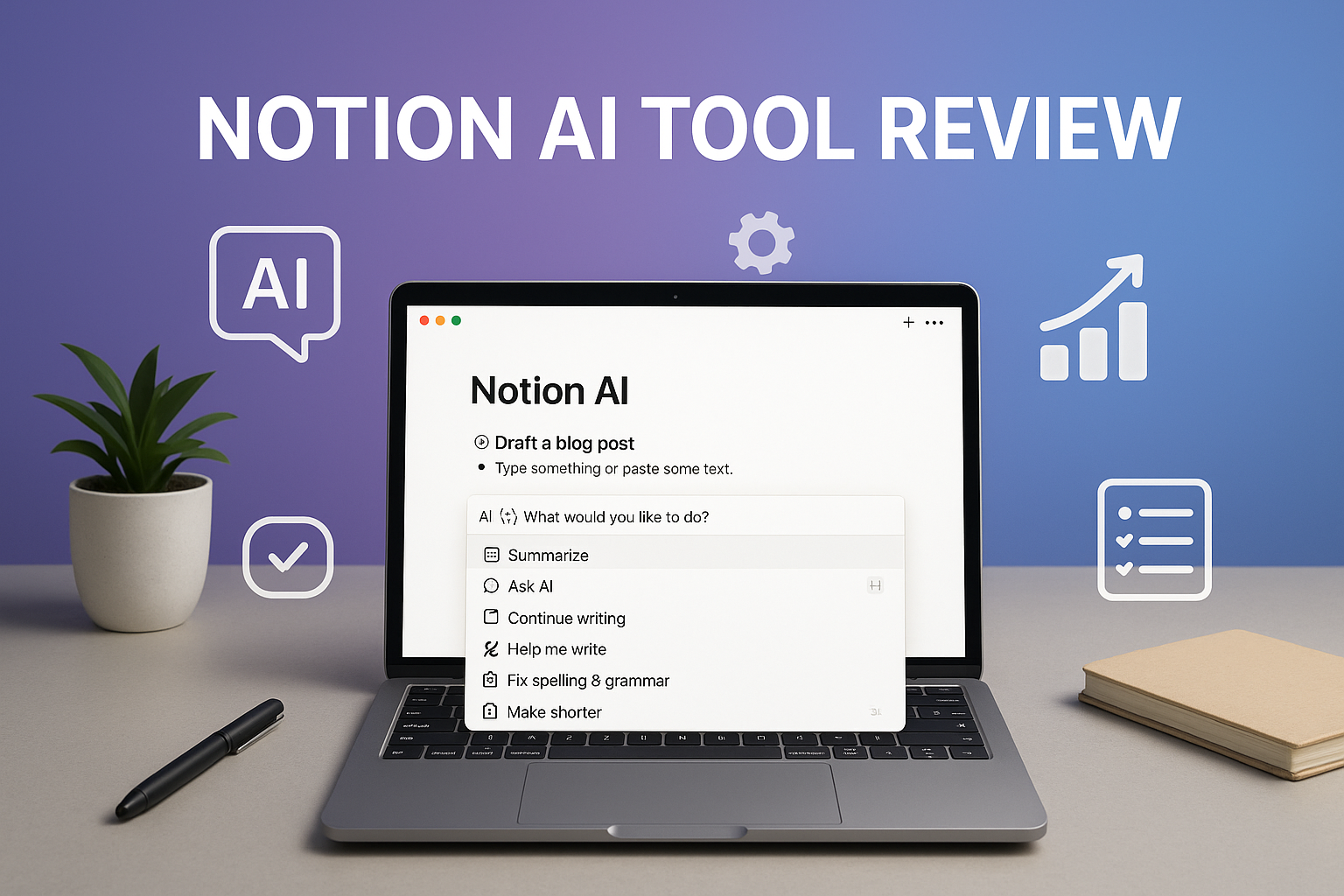
In the rapidly evolving landscape of artificial intelligence and productivity tools, Notion AI has emerged as a game-changing addition to the already popular Notion workspace platform. As businesses and individuals increasingly seek AI-powered solutions to streamline their workflows and enhance productivity, understanding the capabilities, limitations, and value proposition of Notion AI becomes crucial for making informed decisions about your digital toolkit.
This comprehensive Notion AI tool review examines every aspect of this innovative AI assistant, from its core features and pricing structure to real-world use cases and productivity tips. Whether you're a beginner exploring AI tools for the first time or an experienced user comparing alternatives, this analysis provides the insights you need to determine if Notion AI is the right choice for your needs.
The integration of artificial intelligence into productivity platforms represents a significant shift in how we approach work and collaboration. Notion AI stands at the forefront of this transformation, offering users the ability to harness advanced language models like GPT-4 and Claude directly within their familiar Notion workspace. This seamless integration promises to eliminate the friction often associated with switching between multiple AI tools and platforms.
What is Notion AI Tool?
Notion AI represents a sophisticated artificial intelligence layer built directly into the Notion productivity platform, transforming the traditional note-taking and project management experience into an intelligent, context-aware workspace. Unlike standalone AI tools that operate in isolation, Notion AI leverages the rich context of your existing workspace data, including documents, databases, meeting notes, and project information, to provide more relevant and actionable assistance.
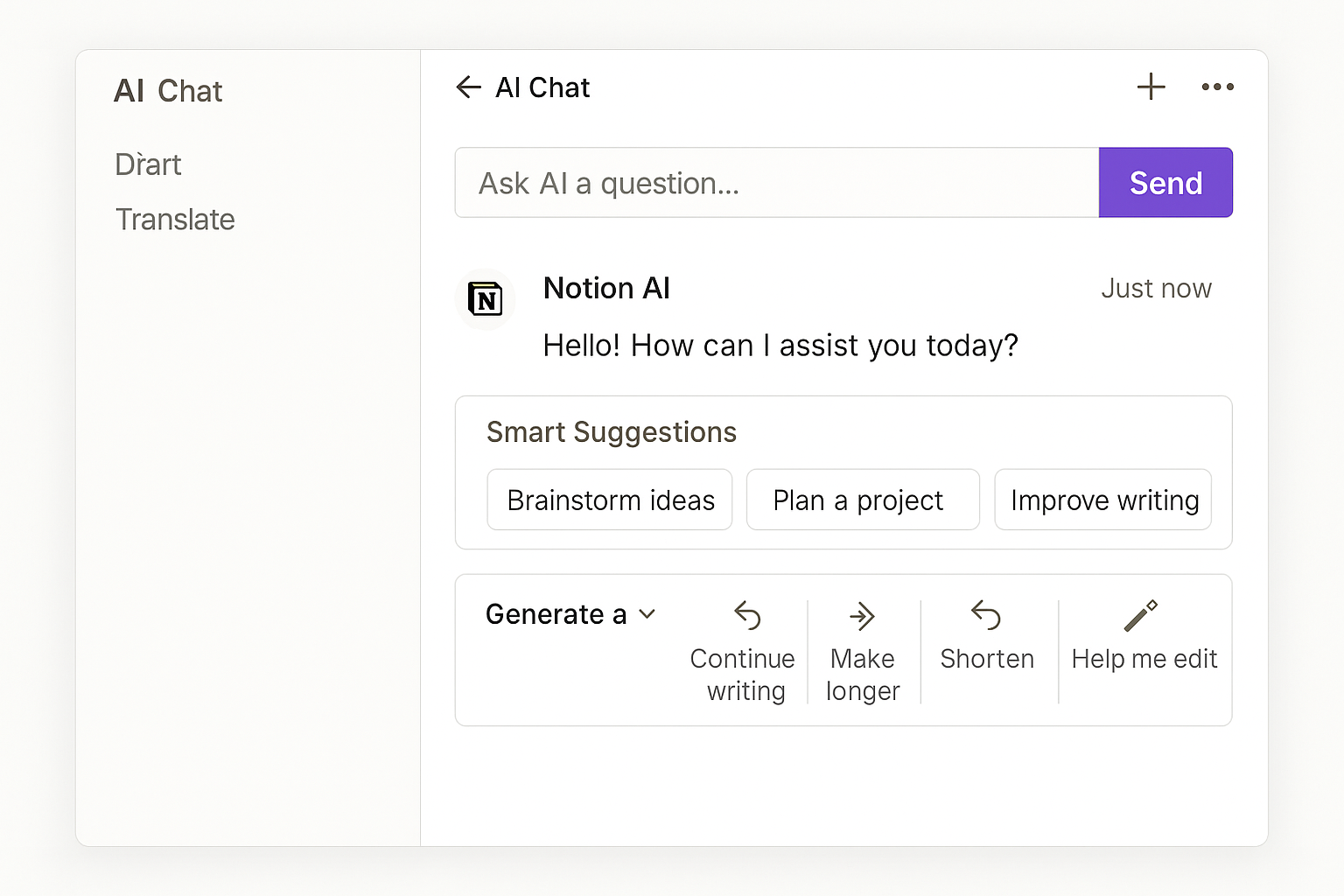
The tool functions as a comprehensive AI assistant that combines multiple capabilities into a single, integrated experience. At its core, Notion AI serves as a chatbot, writing assistant, and intelligent search engine, all powered by cutting-edge language models including GPT-4 and Claude. This multi-faceted approach allows users to interact with their information in ways that were previously impossible, turning static documents into dynamic, interactive knowledge bases.
What sets Notion AI apart from generic AI tools is its deep understanding of your workspace context. When you ask a question or request assistance, the AI doesn't just rely on its training data; it actively searches through your Notion pages, databases, and connected applications to provide answers that are specifically relevant to your work and organization. This contextual awareness makes Notion AI particularly valuable for teams and individuals who have invested heavily in building comprehensive Notion workspaces.
The tool's integration extends beyond the Notion platform itself, connecting with popular business applications like Slack, Google Workspace, and other productivity tools. This cross-platform connectivity ensures that Notion AI can access and synthesize information from across your entire digital ecosystem, providing a truly unified AI experience that understands the full scope of your work environment.
For beginners entering the world of AI-powered productivity tools, Notion AI offers an accessible entry point that doesn't require learning complex prompting techniques or managing multiple AI subscriptions. The interface is designed to be intuitive, with smart suggestions and one-click actions that help users discover the tool's capabilities organically through regular use.
Core Features and Capabilities
Intelligent Writing Assistance
Notion AI's writing capabilities represent one of its most compelling features, offering comprehensive support for content creation, editing, and refinement. The tool can generate initial drafts based on simple prompts, helping users overcome the blank page syndrome that often hampers productivity. Whether you're crafting a business proposal, writing a blog post, or developing project documentation, Notion AI provides intelligent starting points that can be customized and refined to match your specific requirements.
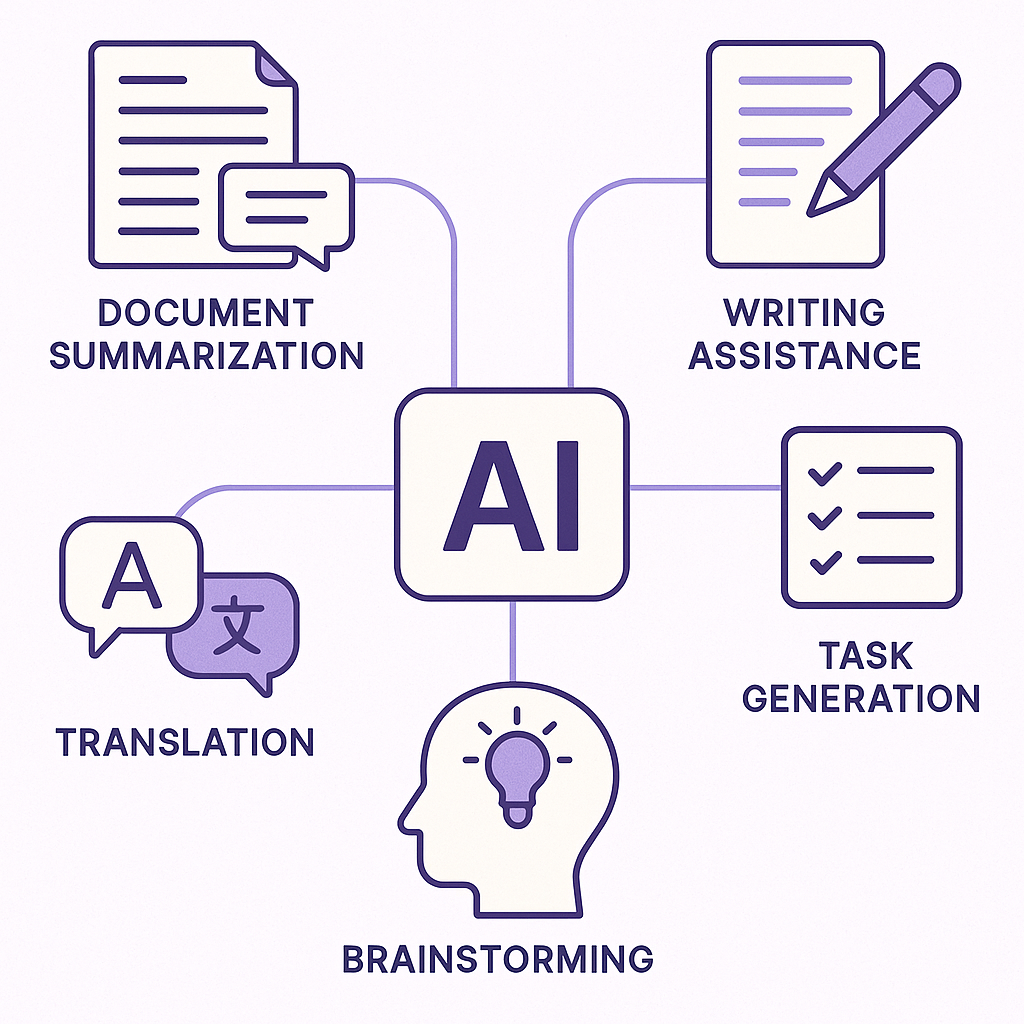
The writing assistance extends far beyond simple content generation. Notion AI excels at improving existing text through grammar correction, style enhancement, and tone adjustment. Users can request specific modifications, such as making content more formal for business communications or more conversational for internal team updates. The tool's ability to understand context and maintain consistency across long documents makes it particularly valuable for complex writing projects that require sustained attention to detail.
One of the most practical applications of Notion AI's writing features is its summarization capability. The tool can distill lengthy documents, meeting transcripts, or research materials into concise, actionable summaries that highlight key points and important decisions. This feature proves invaluable for busy professionals who need to quickly understand the essence of extensive documentation without investing time in reading every detail.
Advanced Document Analysis
Notion AI's document analysis capabilities transform how users interact with their information repositories. The tool can process various file types, including PDFs, images, and text documents, extracting relevant information and providing intelligent insights based on the content. This functionality is particularly powerful when dealing with research materials, contracts, or technical documentation that requires careful analysis and understanding.
The AI's ability to analyze images adds another dimension to its utility. Users can upload screenshots, diagrams, or photographs, and Notion AI can interpret the visual content, extract text, and provide relevant commentary or suggestions. This visual analysis capability makes the tool valuable for design reviews, process documentation, and any workflow that involves visual elements.
When processing documents, Notion AI doesn't simply extract information; it provides contextual analysis that helps users understand implications, identify patterns, and make connections between different pieces of information. This analytical approach transforms passive document storage into active knowledge management, where information becomes more accessible and actionable.
Cross-Platform Integration and Search
The integration capabilities of Notion AI extend its utility far beyond the boundaries of the Notion platform itself. Through connectors for Slack, Google Workspace, and other business applications, the AI can search across your entire digital ecosystem to provide comprehensive answers to questions and requests. This cross-platform functionality eliminates the need to manually search through multiple applications when looking for specific information or trying to piece together context from various sources.
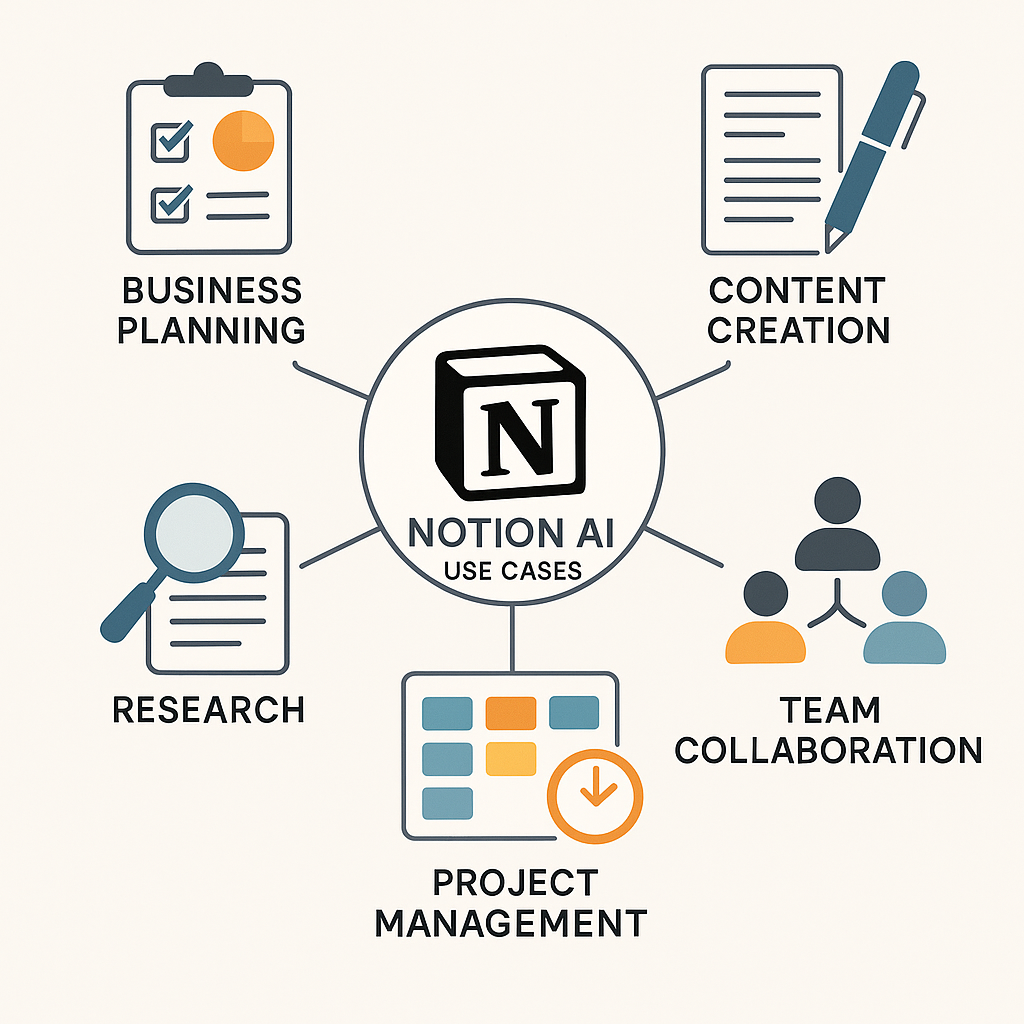
The search functionality powered by Notion AI represents a significant advancement over traditional keyword-based search systems. Instead of requiring users to remember exact terms or phrases, the AI understands natural language queries and can interpret intent to find relevant information even when the query doesn't match the exact wording in documents. This semantic search capability makes information discovery more intuitive and efficient.
For teams that rely heavily on Slack for communication, the integration allows Notion AI to surface relevant discussions, decisions, and context from chat histories. This capability is particularly valuable when trying to understand the background of projects or decisions, as the AI can quickly locate and summarize relevant conversations without requiring manual searching through extensive chat logs.
Task Automation and Database Management
Notion AI's automation capabilities extend to database management and task generation, helping users maintain organized and up-to-date information systems. The tool can automatically create database entries based on meeting notes, extract action items from discussions, and suggest database structures that align with specific use cases or project requirements.
The AI's understanding of database relationships and structures allows it to suggest improvements to existing setups, recommend new properties or views that might enhance functionality, and even populate databases with relevant information extracted from various sources. This database intelligence makes Notion AI particularly valuable for project managers and team leaders who need to maintain comprehensive tracking systems without investing excessive time in manual data entry.
Task generation represents another powerful automation feature, where Notion AI can analyze project descriptions, meeting notes, or strategic documents to identify and create specific, actionable tasks. The tool can assign priorities, suggest deadlines, and even recommend task dependencies based on the context and requirements identified in the source materials.
Pricing Structure and Value Analysis
Understanding the pricing structure of Notion AI is crucial for evaluating its value proposition and determining whether the investment aligns with your productivity needs and budget constraints. The pricing model reflects Notion's approach to AI as an enhancement to their existing platform rather than a standalone product, which has both advantages and considerations for potential users.
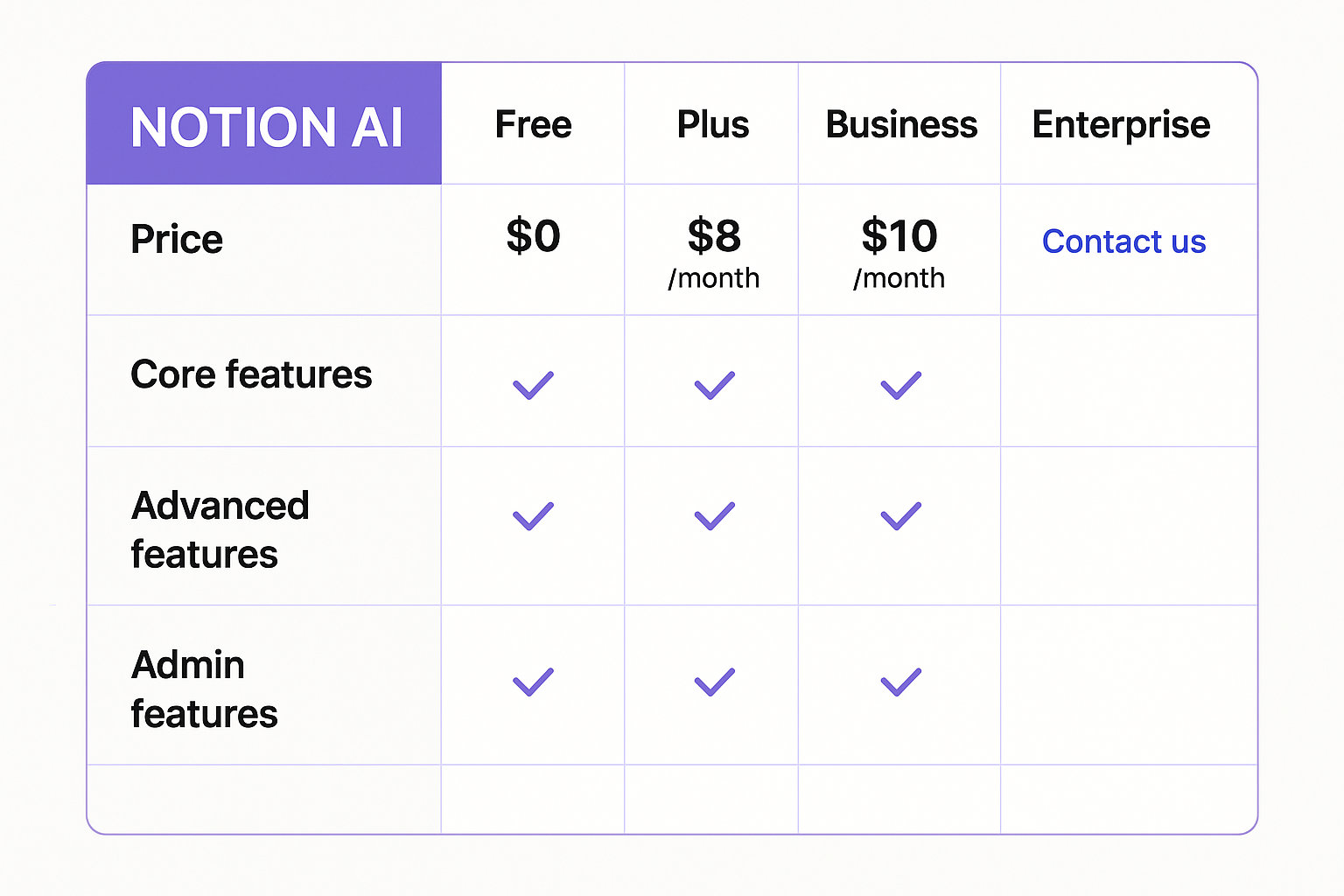
Subscription Tiers and Costs
Notion AI operates as an add-on to existing Notion plans, requiring users to have a paid Notion subscription before accessing AI features. The AI add-on costs $8 per user per month when billed annually, or $10 per user per month for monthly billing. This pricing structure means that the total cost for full Notion AI functionality ranges from $18 to $25 per user per month, depending on your base Notion plan and billing frequency.
The Free and Plus Notion plans include limited trial access to AI features, allowing users to explore the capabilities before committing to the full subscription. However, these trial limitations are quite restrictive, making the paid AI add-on necessary for any serious or sustained use of the AI features. This approach allows Notion to provide a taste of AI capabilities while encouraging upgrades to unlock the full potential.
For Business plan subscribers ($20 per user per month), Notion AI is included at no additional cost, making this tier particularly attractive for teams that want comprehensive AI functionality without separate add-on fees. Enterprise customers receive full AI access as part of their custom pricing arrangements, along with additional features like zero data retention options and enhanced security controls.
Cost Comparison with Alternatives
When evaluating Notion AI pricing, it's essential to consider the total cost of ownership compared to alternative solutions. Many users find themselves subscribing to multiple AI tools to achieve similar functionality, which can quickly become more expensive than the integrated Notion AI approach. For example, combining ChatGPT Plus ($20/month), Grammarly Premium ($12/month), and a dedicated summarization tool can easily exceed the cost of Notion AI while providing a more fragmented experience.
The value proposition becomes particularly compelling for teams already invested in the Notion ecosystem. These users benefit from the seamless integration and contextual awareness that Notion AI provides, features that are difficult to replicate with external AI tools. The ability to work with AI directly within existing workflows, without switching between applications or losing context, represents significant time savings that can justify the subscription cost.
However, for users who primarily need AI for tasks outside of Notion or who prefer best-of-breed solutions for specific use cases, the integrated approach may not provide optimal value. The pricing structure essentially requires commitment to the Notion platform as a whole, which may not align with all workflow preferences or organizational requirements.
Return on Investment Considerations
The return on investment for Notion AI depends heavily on how extensively users leverage the tool's capabilities and how well it integrates with existing workflows. Teams that actively use Notion for project management, documentation, and collaboration typically see the most significant benefits, as the AI can enhance multiple aspects of their existing processes without requiring workflow changes.
Time savings represent the most tangible benefit, with users reporting significant reductions in time spent on routine writing tasks, document summarization, and information retrieval. For knowledge workers whose time is valuable, even modest time savings can quickly justify the subscription cost. The key is ensuring that the AI features are actively used rather than remaining as an expensive but underutilized add-on.
Organizations should also consider the indirect benefits of improved documentation quality, more consistent communication, and enhanced knowledge sharing that Notion AI can facilitate. These improvements may not be immediately quantifiable but can contribute to better team coordination, reduced miscommunication, and more effective decision-making over time.
Comprehensive Feature Analysis
Writing and Content Creation Capabilities
Notion AI's writing capabilities represent a sophisticated approach to content creation that goes far beyond simple text generation. The tool understands context, maintains consistency across long documents, and can adapt its writing style to match specific requirements or audiences. This flexibility makes it valuable for a wide range of content creation scenarios, from technical documentation to marketing materials.
The brainstorming functionality deserves particular attention, as it helps users overcome creative blocks and generate ideas for various projects. Whether you're developing marketing campaigns, planning product features, or exploring strategic options, Notion AI can provide diverse perspectives and suggestions that might not have been immediately obvious. The tool's ability to build upon initial ideas and explore different angles makes it a valuable creative partner rather than just a writing assistant.
Content refinement represents another strength, with Notion AI capable of improving clarity, adjusting tone, and enhancing readability without losing the original meaning or intent. This capability is particularly valuable for teams with diverse writing skills, as it helps ensure consistent quality across all documentation and communications. The tool can also adapt content for different audiences, making technical information more accessible or adjusting formality levels as needed.
Translation and Localization Features
The translation capabilities of Notion AI extend beyond simple language conversion to include cultural adaptation and context preservation. The tool can translate entire pages or specific sections while maintaining formatting and structure, making it practical for international teams or organizations that need to maintain documentation in multiple languages.
What sets Notion AI's translation apart from generic translation tools is its understanding of context and specialized terminology. The AI can maintain consistency in technical terms, brand names, and industry-specific language across translations, ensuring that the meaning and professional tone are preserved regardless of the target language. This contextual awareness makes the translations more reliable for business use than many standalone translation services.
The real-time translation capability allows for dynamic collaboration across language barriers, enabling team members who speak different languages to work together more effectively within the same Notion workspace. This functionality can be particularly valuable for global organizations or diverse teams where language differences might otherwise create communication challenges.
Database and Automation Intelligence
Notion AI's database capabilities transform static information repositories into intelligent, dynamic systems that can adapt and evolve based on usage patterns and requirements. The tool can analyze existing database structures and suggest improvements, recommend new properties that might enhance functionality, and even identify inconsistencies or gaps in data organization.
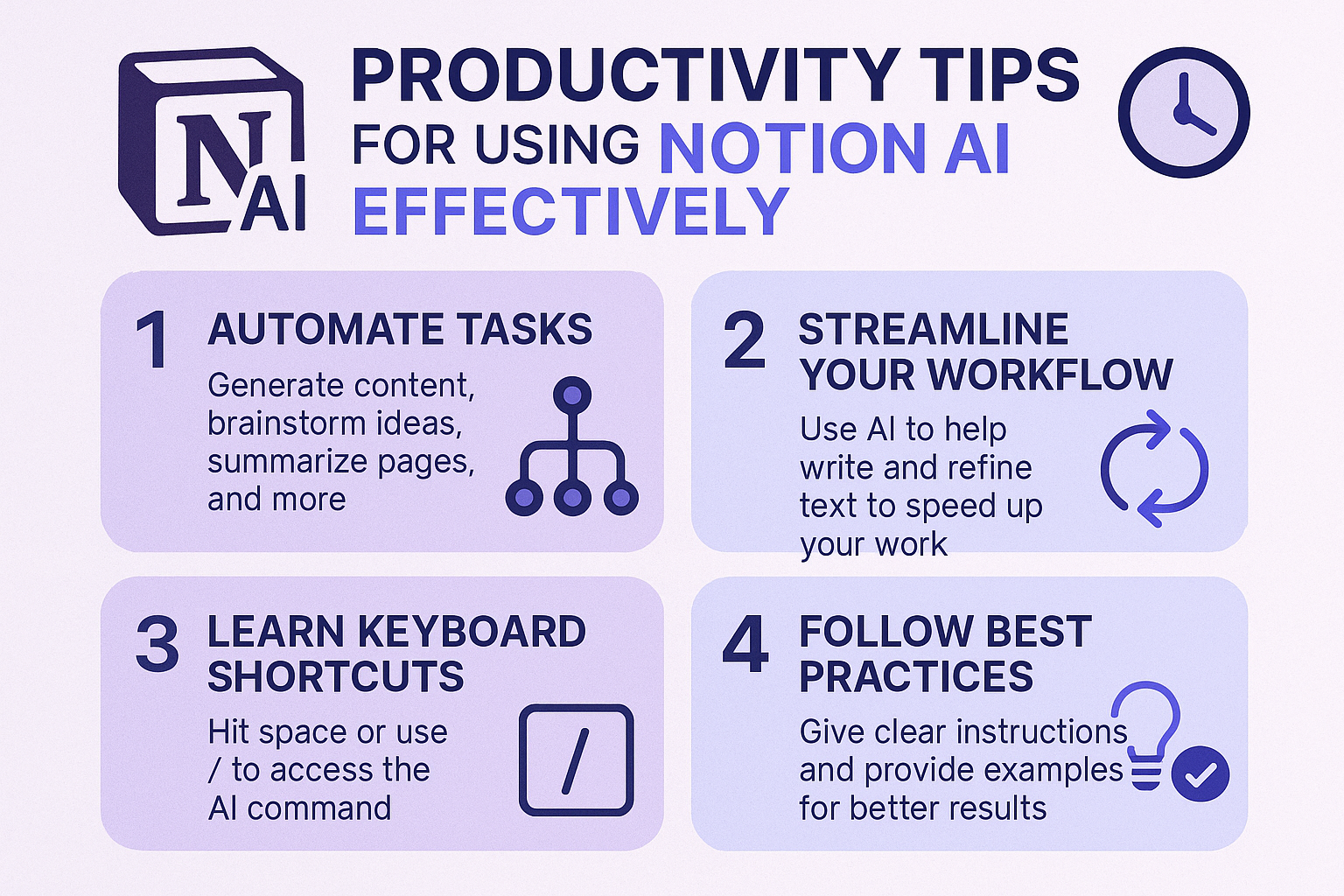
The automation features extend to data entry and maintenance, with Notion AI capable of extracting structured information from unstructured sources like meeting notes, emails, or documents. This capability significantly reduces the manual effort required to maintain comprehensive databases and ensures that important information is captured and organized systematically.
Template generation represents another valuable automation feature, where Notion AI can create customized page templates, database structures, and workflow templates based on specific requirements or use cases. This functionality helps teams establish consistent processes and documentation standards without requiring extensive manual setup or configuration.
Integration and Connectivity Features
The integration capabilities of Notion AI create a unified information ecosystem that spans multiple platforms and applications. The Slack integration allows the AI to search through conversation histories, identify relevant discussions, and surface important decisions or context that might otherwise be buried in extensive chat logs. This connectivity ensures that valuable information shared in informal communications doesn't get lost or forgotten.
Google Workspace integration provides access to documents, spreadsheets, and presentations stored in Google Drive, allowing Notion AI to incorporate information from these sources when responding to queries or generating content. This cross-platform access eliminates the need to manually import or reference external documents, creating a more seamless workflow experience.
The API capabilities of Notion AI enable custom integrations with other business tools and systems, allowing organizations to extend the AI's functionality to match their specific workflow requirements. This flexibility ensures that Notion AI can adapt to existing processes rather than requiring organizations to change their established workflows.
Use Cases and Practical Applications
Business Planning and Strategy Development
Notion AI excels in supporting strategic planning processes by helping teams organize complex information, identify patterns, and develop comprehensive plans based on available data. The tool can analyze market research, competitive intelligence, and internal performance data to provide insights that inform strategic decisions. This analytical capability makes it valuable for executives and strategic planners who need to synthesize large amounts of information into actionable strategies.
The AI's ability to generate scenario analyses and explore different strategic options helps teams consider multiple approaches to challenges or opportunities. By providing diverse perspectives and highlighting potential risks or benefits, Notion AI supports more thorough strategic planning processes that consider a broader range of possibilities than might be immediately apparent to human planners.
Project planning represents another area where Notion AI provides significant value, helping teams break down complex initiatives into manageable tasks, identify dependencies, and establish realistic timelines. The tool can analyze project requirements and suggest resource allocation, milestone definitions, and risk mitigation strategies based on best practices and historical data.
Content Marketing and Communication
For marketing teams, Notion AI provides comprehensive support for content creation, campaign planning, and audience engagement strategies. The tool can generate content ideas based on target audience analysis, industry trends, and competitive research, helping marketers develop more effective and relevant campaigns. The ability to maintain brand voice consistency across different content types and channels ensures that marketing messages remain coherent and professional.
The AI's understanding of different content formats allows it to adapt messaging for various channels, from social media posts to long-form articles, email campaigns, and presentation materials. This versatility reduces the time and effort required to create multi-channel campaigns while ensuring that core messages are effectively communicated across all touchpoints.
Campaign analysis and optimization represent additional strengths, with Notion AI capable of analyzing performance data, identifying successful elements, and suggesting improvements for future campaigns. This analytical approach helps marketing teams continuously improve their effectiveness and achieve better results from their efforts.
Research and Knowledge Management
Academic researchers and business analysts find Notion AI particularly valuable for managing complex research projects that involve multiple sources, diverse data types, and evolving hypotheses. The tool can help organize research materials, identify connections between different sources, and generate summaries that highlight key findings and implications.
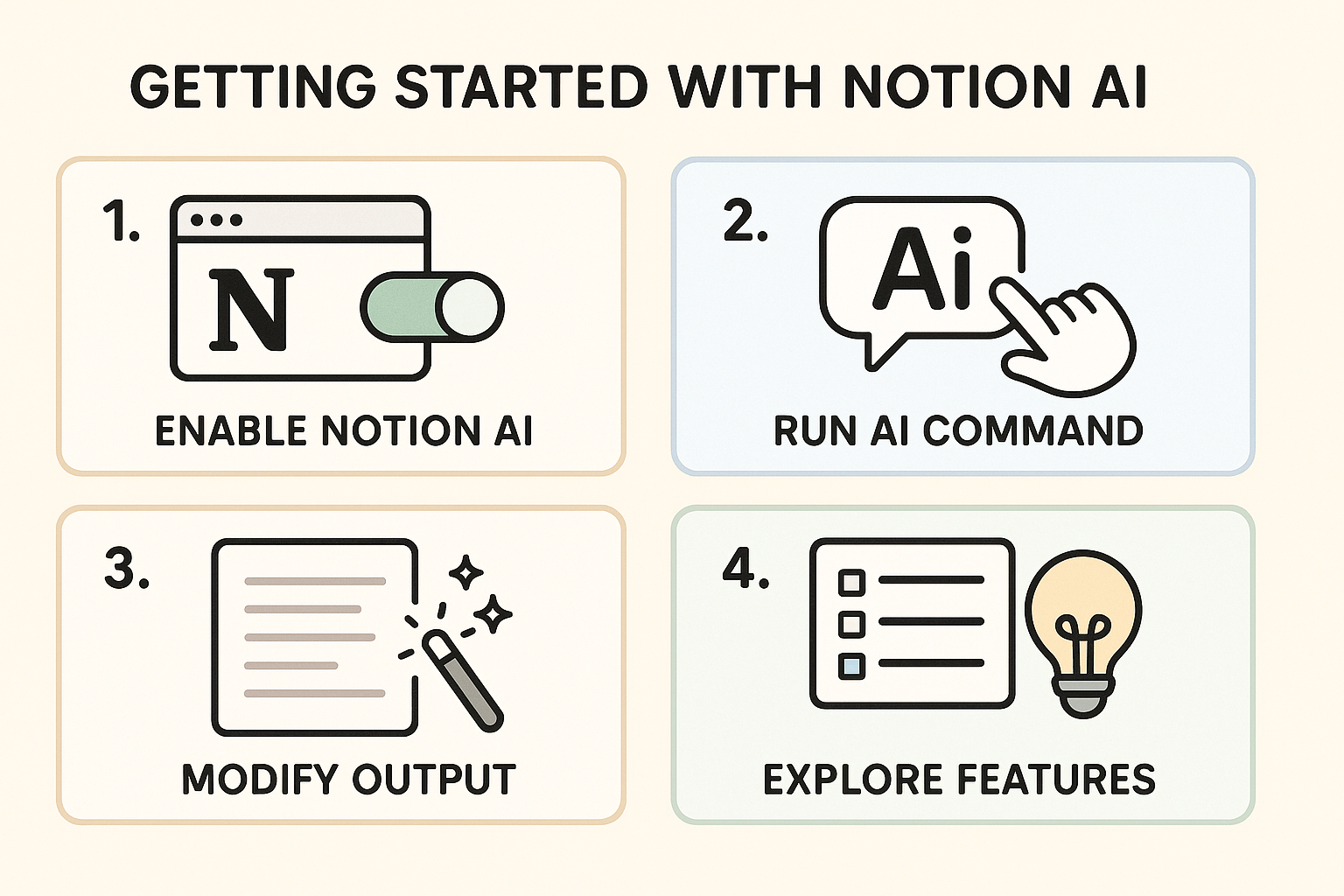
The AI's ability to process and analyze large volumes of information makes it practical for literature reviews, competitive analysis, and market research projects that would otherwise require extensive manual effort. By automating the initial analysis and organization phases, researchers can focus their time on interpretation, critical thinking, and developing insights rather than on routine information processing tasks.
Knowledge base development represents another important application, where Notion AI can help organizations capture, organize, and maintain institutional knowledge in accessible formats. The tool can identify knowledge gaps, suggest documentation improvements, and ensure that important information is preserved and easily discoverable by team members who need it.
Team Collaboration and Project Management
Project managers find Notion AI invaluable for maintaining project documentation, tracking progress, and facilitating team communication. The tool can automatically generate status reports based on project data, identify potential issues or delays, and suggest corrective actions to keep projects on track. This automated monitoring capability helps project managers stay informed about project health without requiring constant manual updates from team members.
Meeting management represents a particularly strong use case, with Notion AI capable of processing meeting recordings or notes to extract action items, decisions, and important discussion points. This capability ensures that meeting outcomes are properly documented and that follow-up actions are clearly defined and assigned, reducing the risk of important items being overlooked or forgotten.
Team onboarding and training benefit from Notion AI's ability to create customized documentation and training materials based on role requirements and organizational processes. The tool can generate role-specific guides, process documentation, and training checklists that help new team members become productive more quickly while ensuring consistency in how information is presented and communicated.
Productivity Tips and Best Practices
Optimizing AI Interactions
Maximizing the value of Notion AI requires understanding how to interact effectively with the tool and structure requests in ways that produce the most useful results. The quality of AI responses depends heavily on the clarity and specificity of user prompts, making it important to develop skills in crafting effective queries that provide sufficient context for the AI to understand the desired outcome.
Providing context is crucial for getting relevant and useful responses from Notion AI. Rather than asking generic questions, users should include relevant background information, specify the intended audience or purpose, and clarify any constraints or requirements that should influence the response. This contextual information helps the AI generate more targeted and practical suggestions that align with specific needs and circumstances.
Iterative refinement represents a key strategy for working effectively with Notion AI. Rather than expecting perfect results from initial prompts, users should view AI interactions as collaborative processes where initial responses can be refined, expanded, or redirected based on feedback and additional requirements. This iterative approach often produces better final results than attempting to craft perfect prompts from the beginning.
Workflow Integration Strategies
Successful implementation of Notion AI requires thoughtful integration with existing workflows rather than wholesale replacement of established processes. The most effective approach involves identifying specific pain points or time-consuming tasks within current workflows and gradually introducing AI assistance to address these challenges while maintaining overall process integrity.
Template development represents a powerful strategy for scaling AI benefits across teams and projects. By creating standardized templates that incorporate AI prompts and suggestions, organizations can ensure consistent quality and approach while reducing the learning curve for team members who are new to AI tools. These templates can evolve over time based on experience and changing requirements.
Establishing clear guidelines for AI use helps teams maintain quality standards and avoid potential pitfalls associated with over-reliance on automated assistance. These guidelines should address when AI assistance is appropriate, how to verify and validate AI-generated content, and what level of human review is required for different types of outputs.
Advanced Feature Utilization
Power users can leverage advanced Notion AI features to create sophisticated automation and analysis workflows that go beyond basic content generation. The tool's ability to work with databases and structured information enables complex data analysis and reporting capabilities that can provide valuable insights for decision-making and strategic planning.
Custom prompt libraries represent an advanced strategy for maximizing AI effectiveness. By developing and maintaining collections of proven prompts for common tasks and scenarios, teams can ensure consistent results and reduce the time required to achieve desired outcomes. These libraries can be shared across teams and refined based on experience and feedback.
Integration with external tools and APIs allows advanced users to extend Notion AI capabilities beyond the platform's native features. By connecting AI workflows with other business systems, organizations can create comprehensive automation solutions that span multiple platforms and provide seamless user experiences.
Comparison with Leading Alternatives
Notion AI vs ChatGPT
The comparison between Notion AI and ChatGPT reveals fundamental differences in approach and value proposition that make each tool suitable for different use cases and user preferences. ChatGPT offers superior conversational capabilities and more advanced reasoning for complex queries, while Notion AI provides better integration with existing workflows and access to workspace-specific context.
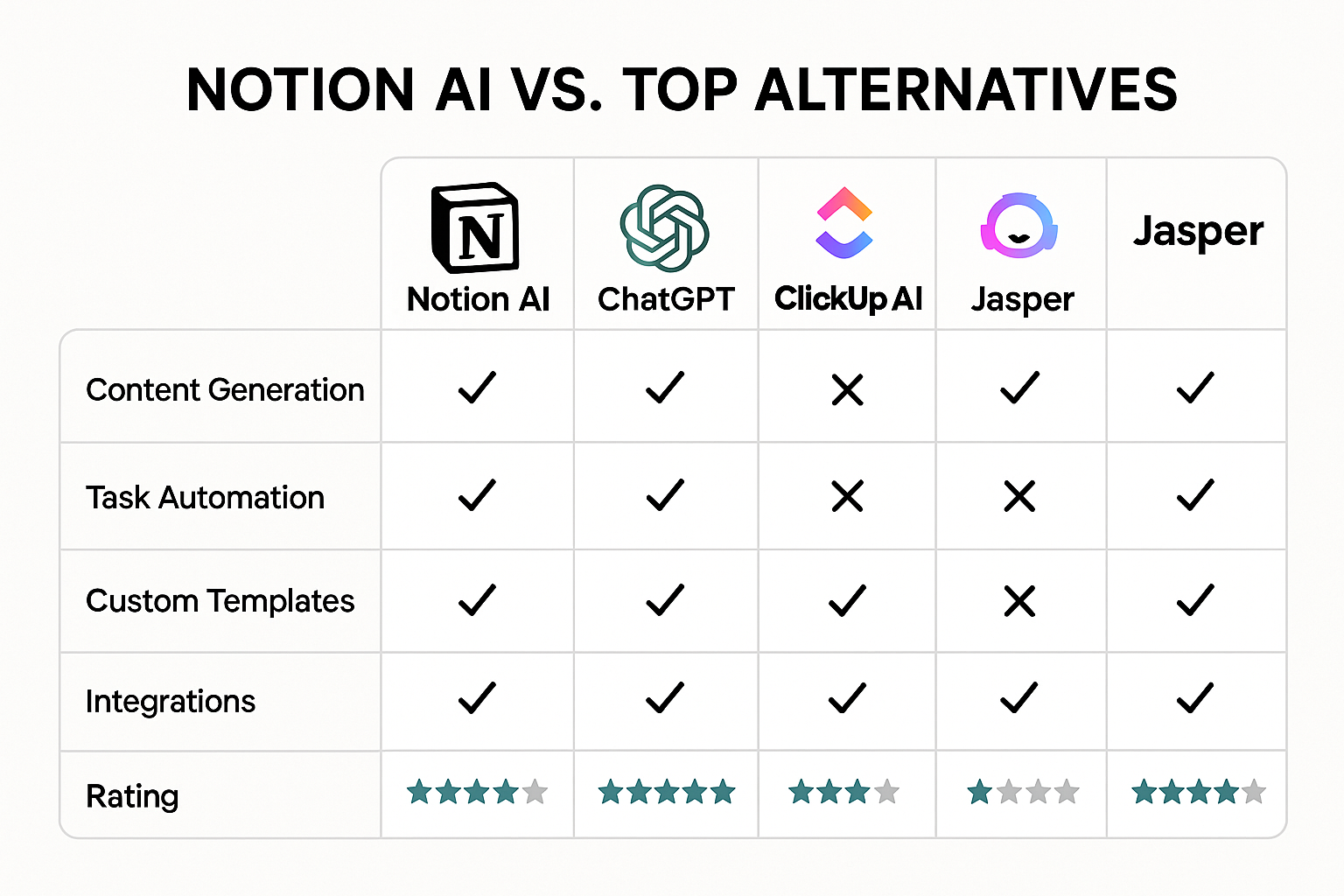
ChatGPT's strength lies in its versatility and ability to handle diverse queries across virtually any topic or domain. The tool excels at creative tasks, complex problem-solving, and providing detailed explanations on technical subjects. For users who need a general-purpose AI assistant that can handle a wide range of tasks, ChatGPT often provides more comprehensive and nuanced responses than Notion AI.
However, Notion AI's integration advantages become apparent when working with existing documents, databases, and team information. The tool's ability to understand workspace context and provide relevant suggestions based on actual project data makes it more practical for routine business tasks and collaborative work. Users who primarily work within Notion environments often find that the integrated approach provides better value despite ChatGPT's superior general capabilities.
The pricing comparison favors different users depending on their needs. ChatGPT Plus at $20 per month provides unlimited access to advanced AI capabilities, while Notion AI's $8-10 monthly add-on requires an existing Notion subscription. For teams already using Notion extensively, the integrated approach often provides better overall value, while individual users or those with diverse AI needs might prefer ChatGPT's flexibility.
Notion AI vs ClickUp AI
ClickUp AI represents a direct competitor to Notion AI in the integrated productivity tool space, offering AI capabilities within a comprehensive project management and collaboration platform. Both tools share the advantage of providing AI assistance within existing workflows, but they differ significantly in their approach to information organization and team collaboration.
ClickUp AI excels in project management scenarios, with sophisticated task automation, timeline optimization, and resource allocation capabilities that are specifically designed for complex project environments. The tool's integration with ClickUp's robust project management features makes it particularly valuable for teams that need advanced project tracking and coordination capabilities alongside AI assistance.
Notion AI's strength lies in its flexibility and document-centric approach, making it better suited for knowledge work, content creation, and information management scenarios. The tool's database capabilities and cross-platform integrations provide advantages for teams that need to manage diverse types of information and maintain comprehensive documentation alongside their project work.
The choice between these platforms often depends on whether teams prioritize project management capabilities or information management and documentation. Organizations with complex project requirements and structured workflows may find ClickUp AI more suitable, while teams focused on knowledge work and flexible collaboration often prefer Notion AI's approach.
Notion AI vs Jasper and Other Writing-Focused Tools
Jasper and similar writing-focused AI tools offer specialized capabilities for content creation, marketing, and copywriting that often exceed Notion AI's writing features in terms of sophistication and output quality. These tools typically provide more advanced templates, style options, and optimization features specifically designed for marketing and content creation workflows.
Jasper's strength lies in its marketing focus, with features designed specifically for creating advertising copy, social media content, and marketing materials that are optimized for engagement and conversion. The tool's understanding of marketing principles and audience psychology often produces more effective marketing content than general-purpose AI tools like Notion AI.
However, Notion AI's integrated approach provides advantages for teams that need writing assistance as part of broader productivity and collaboration workflows. The ability to generate content directly within project documentation, meeting notes, and strategic planning documents creates a more seamless experience for teams that don't specialize in content creation but need occasional writing assistance.
The cost comparison often favors Notion AI for teams that need moderate writing assistance alongside other productivity features, while organizations with significant content creation requirements may find specialized tools like Jasper provide better value despite higher costs or additional complexity.
2025 Features and Future Developments
Recent Updates and Enhancements
The 2025 updates to Notion AI have introduced several significant enhancements that expand the tool's capabilities and improve user experience. The introduction of image generation capabilities allows users to create visual content directly within their Notion pages, eliminating the need for external design tools for basic graphics and illustrations. This feature integrates seamlessly with existing workflows, enabling users to generate diagrams, illustrations, and visual aids that support their documentation and presentation needs.
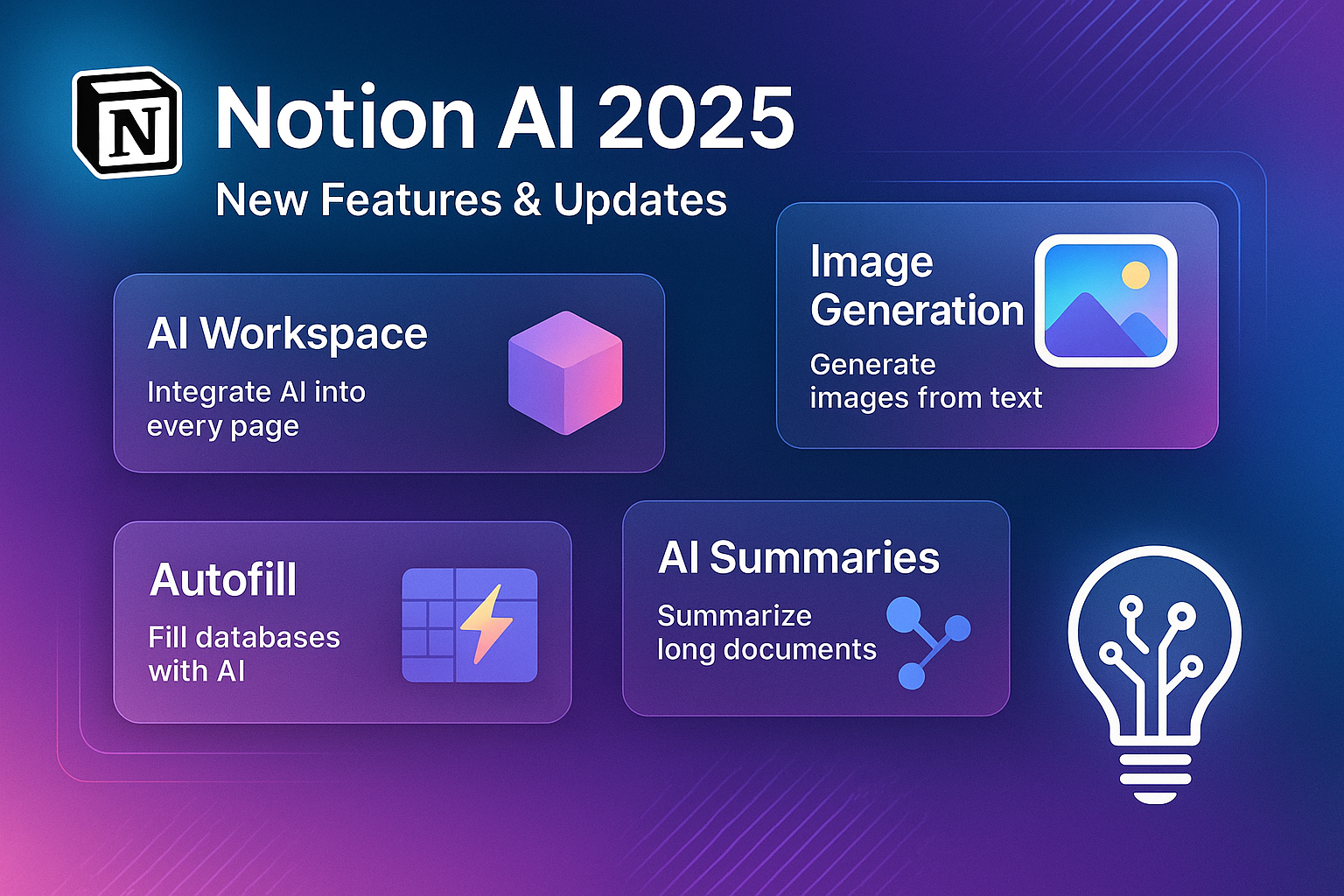
Enhanced meeting notes functionality represents another major improvement, with AI-powered transcription and analysis capabilities that can process audio recordings to generate comprehensive meeting summaries, action items, and decision logs. This feature significantly reduces the administrative burden associated with meeting documentation while ensuring that important information is captured and organized systematically.
The research mode enhancement provides more sophisticated information gathering and analysis capabilities, allowing users to conduct comprehensive research on topics by automatically searching across multiple sources and synthesizing findings into coherent reports. This feature is particularly valuable for strategic planning, competitive analysis, and academic research scenarios where comprehensive information gathering is essential.
Advanced Integration Capabilities
The 2025 version of Notion AI includes expanded integration options that connect with a broader range of business applications and data sources. Enhanced API capabilities allow for more sophisticated custom integrations, enabling organizations to connect Notion AI with specialized tools and systems that are specific to their industry or workflow requirements.
Real-time collaboration features have been improved to support more dynamic team interactions, with AI assistance that can adapt to ongoing conversations and provide contextual suggestions based on the current discussion focus. This enhancement makes Notion AI more valuable for live collaboration scenarios where teams need immediate assistance and suggestions during active work sessions.
The introduction of workflow automation templates provides pre-configured AI assistance for common business processes, reducing the setup time required to implement AI-enhanced workflows. These templates cover scenarios like project onboarding, content review processes, and strategic planning workflows, allowing teams to quickly implement proven AI-assisted processes without extensive customization.
Performance and Reliability Improvements
Significant improvements in response speed and accuracy have been implemented in the 2025 version, with optimized processing that reduces latency and provides more consistent results across different types of queries and tasks. These performance enhancements make Notion AI more practical for real-time use scenarios where immediate responses are important for maintaining workflow momentum.
Enhanced error handling and recovery capabilities ensure more reliable operation, with improved ability to handle complex queries and edge cases that might have caused issues in earlier versions. This reliability improvement is particularly important for business-critical workflows where AI assistance needs to be dependable and consistent.
The implementation of advanced caching and optimization techniques has improved the tool's ability to work with large datasets and complex workspace configurations, ensuring that performance remains consistent even as organizations scale their use of Notion AI across larger teams and more extensive information repositories.
Limitations and Considerations
Technical Limitations
Despite its impressive capabilities, Notion AI has several technical limitations that users should understand before implementing the tool in critical workflows. The AI's knowledge cutoff means that it may not be aware of very recent events or developments, potentially leading to outdated information in responses that require current data. This limitation is particularly important for rapidly evolving fields or situations where recent developments significantly impact the accuracy of AI-generated content.
The tool's dependence on internet connectivity means that AI features are unavailable during network outages or in environments with limited connectivity. This dependency can be problematic for users who need consistent access to AI assistance regardless of their network situation, particularly when working in remote locations or during travel.
Processing limitations become apparent when working with very large documents or complex queries that require extensive analysis. While Notion AI handles most routine tasks efficiently, users may experience slower response times or reduced accuracy when pushing the tool to its processing limits. Understanding these boundaries helps users set appropriate expectations and develop workflows that work within the tool's capabilities.
Privacy and Security Considerations
Data privacy represents a significant consideration for organizations evaluating Notion AI, particularly those in regulated industries or handling sensitive information. While Notion provides security controls and data protection measures, the use of AI processing means that content is analyzed by external AI models, which may raise concerns for organizations with strict data handling requirements.
The retention and use of data for AI training purposes is another important consideration, although Notion provides options for organizations to opt out of data sharing for model training. Understanding these options and configuring appropriate settings is essential for maintaining compliance with organizational data policies and regulatory requirements.
Cross-border data transfer implications may affect organizations operating in jurisdictions with strict data localization requirements. The global nature of AI processing infrastructure means that data may be processed in different geographic locations, which could conflict with certain regulatory or policy requirements.
Cost and Value Limitations
The subscription model for Notion AI may not provide optimal value for all use cases, particularly for occasional users or organizations with limited AI requirements. The requirement for an existing Notion subscription means that the total cost of ownership can be significant for users who don't extensively use the base Notion platform features.
Feature limitations compared to specialized AI tools may make Notion AI less suitable for organizations with specific, advanced AI requirements. While the integrated approach provides convenience, it may not match the capabilities of best-of-breed solutions for particular use cases like advanced content creation, complex data analysis, or specialized industry applications.
The learning curve associated with maximizing Notion AI's value can be significant, requiring investment in training and process development to achieve optimal results. Organizations should factor in these implementation costs when evaluating the total cost of ownership and expected return on investment.
Conclusion and Recommendations
Notion AI represents a significant advancement in integrated productivity tools, offering a compelling combination of artificial intelligence capabilities and seamless workflow integration that addresses many of the pain points associated with traditional AI tool implementations. The tool's strength lies in its ability to provide contextual, relevant assistance within existing work environments, eliminating the friction and context-switching that often limit the practical value of standalone AI solutions.
For organizations already invested in the Notion ecosystem, Notion AI provides exceptional value by enhancing existing workflows without requiring significant process changes or additional tool management overhead. The integrated approach ensures that AI assistance is available precisely when and where it's needed, making it more likely that teams will consistently leverage AI capabilities to improve their productivity and output quality.
The tool is particularly well-suited for knowledge workers, content creators, project managers, and teams that prioritize collaboration and documentation. These users will find that Notion AI's capabilities align well with their daily tasks and workflow requirements, providing tangible benefits that justify the subscription cost and implementation effort.
However, organizations with specialized AI requirements or those seeking best-in-class capabilities for specific use cases may find that dedicated AI tools provide better value despite the additional complexity of managing multiple solutions. The decision should be based on a careful evaluation of specific needs, existing tool investments, and the importance of integration versus specialized functionality.
For beginners exploring AI tools, Notion AI offers an accessible entry point that provides exposure to a wide range of AI capabilities without requiring extensive technical knowledge or complex setup procedures. The intuitive interface and contextual suggestions help users discover valuable applications organically, making it an excellent choice for individuals and teams taking their first steps into AI-enhanced productivity.
Looking ahead to 2025 and beyond, Notion AI's continued development and enhancement suggest that the tool will become increasingly valuable as AI capabilities mature and integration becomes more sophisticated. Organizations considering long-term AI strategies should evaluate Notion AI as a foundational platform that can evolve with their needs while providing immediate value for current requirements.
The key to success with Notion AI lies in thoughtful implementation that aligns the tool's capabilities with specific organizational needs and workflows. Users who invest time in understanding the tool's strengths and limitations, develop effective prompting strategies, and integrate AI assistance into their established processes will realize the greatest benefits from their investment in this innovative productivity platform.
